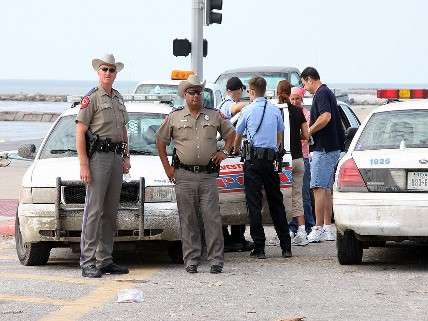San Antonio Police Union Rejects Reforms Unless They Get Paid More
San Antonio PD has one of the least accountable contracts in the country and were already set for a 14 percent raise.


The San Antonio Police Department's union has negotiated a new contract, set to be voted on by city officials, which will contain a 14 percent pay raise and none of the reforms proposed by the city's mayor. But, according to the San Antonio News-Express, the union would have been willing to accept some of the proposals — which consisted of some very basic measures meant to ensure greater accountability — if the department-wide pay increase were substantially increased.
Among the proposed reforms were the end of the current practice which prevents police supervisors from using evidence of officer misconduct that is more than two years old as a consideration when deciding on how to discipline officers for more recent instances of bad behavior. It seems past incidents of conduct unbecoming of an officer would be relevant in determining whether senior police officials should demote or fire a rogue cop, but such is the nature of public sector collective bargaining — if you want basic and reasonable rules promoting accountability, taxpayers have to pay the price.
One activist quoted by ThinkProgess described the San Antonio PD's position as "essentially extortion," while another referred to it as "provision ransom."
Earlier this year, the Black Lives Matter-affiliated project Check the Police obtained the police union contracts of 81 of the U.S.'s 100 largest cities through Freedom of Information Act (FOIA) requests and published them on its website. Of the six factors which make it hardest to hold officers accountable for misconduct, San Antonio's union contract checked all six boxes, including allowing officers to delay interrogations and giving them more access to information than their accusers are entitled to.
San Antonio's police union's refusal to allow even basic reforms (unless they're paid significantly more) is in keeping with trends in Boston, Seattle, Chicago, and Cincinnatti. In each of those cities, the police unions have demanded the public "pony up" if they want cops to wear body cameras or accept modest adjustments meant to provide greater transparency and accountability in policing.
Editor's Note: As of February 29, 2024, commenting privileges on reason.com posts are limited to Reason Plus subscribers. Past commenters are grandfathered in for a temporary period. Subscribe here to preserve your ability to comment. Your Reason Plus subscription also gives you an ad-free version of reason.com, along with full access to the digital edition and archives of Reason magazine. We request that comments be civil and on-topic. We do not moderate or assume any responsibility for comments, which are owned by the readers who post them. Comments do not represent the views of reason.com or Reason Foundation. We reserve the right to delete any comment and ban commenters for any reason at any time. Comments may only be edited within 5 minutes of posting. Report abuses.
Please to post comments


My new home ? *
*runs into bedroom slams the door and throws xiself onto the bed sobbing*
Public servants my ass, these assholes need to be fired en masse. It's like blackmail-give is more money or we won't take these fairly simple steps that will provide the public with substantial benefit. It's fucking pathetic.
I wonder if a brave city council could just say, "That's great. We're cutting current pension payments to make up for it. Y'all work it out between yourselves who gets what cut of our police money."
How many times do they need to tell you? They aren't here for you.
Heard on the radio the other day that cops were blaming Walmart for all the calls they get from their stores because Walmart should have their own private security. So Walmart doesn't pay taxes? Maybe we should all have private security and fire all the cops.
Not only does Walmart pay the many taxes that are piled on businesses ,across the river in Vienna WV , many other businesses moved in to take advantage of the increased traffic. That's a real multiplier.
"Walmart should have their own private security"
I think that means "off-duty cops earning some extra income as private security guards."
The police force as a whole is being asked by the People (the government) to police things they shouldn't need to police in the first place.
If this continues, there is only one outcome: only bad-natured people will remain in the police force.
No idea how long that evolution process will take to complete though.
That ship sailed long long ago my friend.
Public sector unions should be outlawed.
1 We generally don't need them. Police forces are too large.
2 The terms of investigations should be fixed by the jurisdiction.
3 But the union should be free to negotiate per the terms.
Negotiate with the politicians that they bribe for money that comes out of the taxpayers pocket.
No,public unions should be outlaw as JB said above. You get what the public an and are willing to pay or go try your luck in else where. Any illegal use of force or lying on a report should be automatic termination and criminal charges.
Extortion is such a harsh word.
The government resembles the mafia in many ways.
So true,I'm just glad footballs back Browns offense looked better last night. Then again,I was drinking.
Didn't see it but heard on radio this morning that RG3 looked really good.
Good for RG3. the Redskins tried to use him up and spit him out. I'd love to see him thrive elsewhere.
As always, showering more benefits on the public sector usually results in more fiscal responsibility and a much better return on the tax payer investment.
This seems like a good idea.
The bureaucrats in my town in the public school system pull down $150,000 per year. This is for the 2nd and 3rd in command of a totally failing system.
Boy, do I miss Ronald Reagan and his intestinal fortitude. People need to remember what happened to the air traffic controllers and follow suit.
Fire all of those ungrateful bastards and bitches. Then see how they do in a real job market.
Cops can carry their guns if they settle for a ~3% raise.
Cops must turn in their guns if they want a higher raise in pay.
Why?
Simple math: Cops with guns have a higher potential to shoot innocent people, and that causes insurance rates to go up. So if you want to carry a gun, you get less of a raise because that extra money is to cover the insurance. If don't carry a gun, pocket the extra.
That solves a lot of problems all at once. Let's see the union talk around that one.
They wouldn't be able to comprehend that the ratchet could go the other way. It just doesn't fit their world view.
See, this is what happens when you let the inmates run the asylum.
Implementation of the law and accountability should not be negotiable. The law is not decided by contract negotiations.